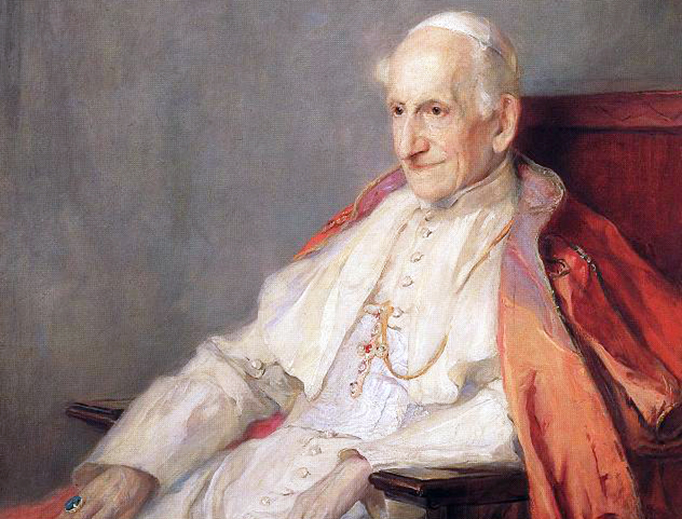A Catholic Case for Capitalism
What popes have taught, from Rerum Novarum to Centesimus Annus

The Catholic Church has straddled the economic fence since its founding in A.D. 33.
There were references in Scripture to the early disciples of Christ selling their own goods to benefit their communities of believers (Acts 2:45). From this, you have some arguing that Jesus was a socialist.
Then you have the parable of the talents, where investing is advocated, to the point where not investing is considered “wicked” (Matthew 25:14-30). In other places, respect for private property is spelled out (Deuteronomy 27-17, Exodus 20:17, et al.). These latter passages, taken together, would seem to indicate a deference to capitalism. (Of course, this is not to diminish the additional layers of meaning involved in each, however, such as developing the virtue of generosity and making full and virtuous use of the abilities God has given each of us.)
And yet, the Church has historically seen both economic philosophies, when taken to the extreme, as being unwise.
For most of Christian history, there have been few means of protecting the “little guy” from oppression by ruthless tyrants in government or unwarranted exploitation by tycoons of industry.
By the same token, socialism has been denounced, explicitly, since shortly after Karl Marx proposed such notions in the 19th century. Pope Leo XIII issued the encyclical Rerum Novarum on May 15, 1891, to address this. His pontificate also coincided with the era of the robber barons and the “trusts” that U.S. President Theodore Roosevelt saw fit to break up soon afterward.
In addressing both ends of this spectrum in Rerum Novarum, Leo XIII had this to say:
The hiring of labor and the conduct of trade are concentrated in the hands of comparatively few; so that a small number of very rich men have been able to lay upon the teeming masses of the laboring poor a yoke little better than that of slavery itself.
To remedy these wrongs the socialists, working on the poor man's envy of the rich, are striving to do away with private property… They are (the socialists), moreover, emphatically unjust, for they would rob the lawful possessor, distort the functions of the State, and create utter confusion in the community.
He goes on to say, ‘…Is it just that the fruit of a man's own sweat and labor should be possessed and enjoyed by anyone else?’
Many measures have been taken over the last 100 years by governments around the world to spell out and to protect workers’ rights, not the least of which have been safety measures in the workplace, and collective bargaining for some semblance of fair wages and benefits. Even in relatively “free” countries (like the U.S.) governments have assumed ownership of a broad swath of their economies to make sure basic infrastructure is provided, as well as broad oversight on education, transportation, communication, the environment and health care. Though arguments could be made that too much (or not enough) has been done in these areas, it’s reasonable to say that many governments have done some good in these areas, at a time when protection for both workers and consumers was needed.
However, the Church has never idealized government involvement as part of its doctrine. It has simply been seen, historically, as a means to an end. Government has been viewed as the vehicle to help facilitate a sense of fairness and justice in society. However, the current overreach of socialism — even in “market” economies like ours — flies in the face of the Catholic Church tenet of subsidiarity. This is the idea that nothing should be done by a larger and more complex organization that can be done as well by a smaller and simpler organization. In other words, any activity which can be performed by a more decentralized entity should be.
Pope St. John Paul II addressed this overreach specifically in his 1991 encyclical, Centesimus Annus, reiterating a century later those profound insights provided by Leo XIII. He said that our current welfare state “leads to a loss of human energies and an inordinate increase of public agencies which are dominated more by bureaucratic ways of thinking than by concern for serving their clients and which are accompanied by an enormous increase in spending.” And yet, we continue to hear many Catholics call for even more government solutions to various problems.
Still another unintended consequence of encouraging government to take an increasing role specifically in the area of social welfare programs is that individual and private efforts are being undermined. This emphasis on government seems to be leading many to assume that giving to charitable causes isn’t needed because “that’s why I pay taxes.” Or, even when we’re paying less in taxes, when charitable contributions aren’t itemized, they are easier to dismiss. This is likely leading to many of us not seeing Christ in the face of the poor. We’re being trained to look the other way, because we feel some sort of moral rationalization for doing so.
So, what could possibly replace the role of government in helping bring about a more fair and just society? Capitalism. We have reached a point economically, technologically and societally, where authentic capitalism has a real chance of finally being unleashed, for the betterment of all — a point I’ll explain in a future column.
- Keywords:
- capitalism
- catholic social teaching

















